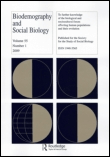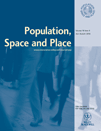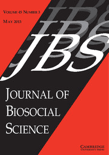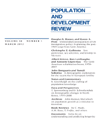
DEMOGRAPHY
Scope & Guideline
Advancing insights into human populations.
Introduction
Aims and Scopes
- Population Dynamics and Change:
Research on trends in birth, death, migration, and aging, exploring how these dynamics influence and are influenced by societal factors. - Social and Economic Inequality:
Investigating disparities in health, wealth, and opportunities across different demographic groups, including race, gender, and socioeconomic status. - Family and Household Structures:
Analyzing patterns and changes in family composition, parenting, and living arrangements, particularly in relation to economic and social policies. - Health Outcomes and Determinants:
Examining the relationships between demographic factors and health outcomes, including the impact of socioeconomic status, environment, and access to healthcare. - Methodological Innovations:
Development and application of new statistical and analytical methods for demographic research, enhancing the understanding of complex population dynamics.
Trending and Emerging
- Impact of Policy on Demographic Outcomes:
Research increasingly focuses on how government policies, such as welfare reforms and tax credits, affect demographic behaviors and outcomes, particularly among vulnerable populations. - Health Disparities and Social Determinants:
There is a rising emphasis on understanding health disparities tied to demographic factors, with studies exploring the socio-economic and environmental determinants of health. - Intergenerational and Life Course Perspectives:
Emerging studies are adopting a life course approach, examining how early life experiences and intergenerational factors shape demographic outcomes across the lifespan. - Migration and Globalization Effects:
Research is increasingly addressing the complexities of migration in a globalized world, including the impact of migration on family structures, economic opportunities, and social integration. - Technological and Data Innovations in Demography:
The integration of new technologies and data sources, such as social media and digital traces, is becoming prominent, enabling more comprehensive and real-time demographic analysis.
Declining or Waning
- Traditional Fertility Studies:
Research centered solely on fertility rates and patterns has waned as the field has shifted towards understanding the broader implications of fertility decisions within socio-economic contexts. - Immigration as a Standalone Topic:
Studies focusing exclusively on immigration without considering the intersection of race, health, and economic factors have become less frequent, as a more integrated approach is now preferred. - Static Economic Models of Population:
The use of rigid economic models that do not account for the dynamic and multifaceted nature of demographic changes is declining, with a growing emphasis on more nuanced, interdisciplinary approaches.
Similar Journals

Journal of Demographic Economics
Shaping Policy with Rigorous Demographic AnalysisThe Journal of Demographic Economics, published by Cambridge University Press, stands as a leading interdisciplinary platform dedicated to the exploration and advancement of research in the intertwined fields of demography, economics, and geography. With an impact factor that reflects its esteemed position—ranking in the Q1 quartile for Demography (2023)—the journal fosters scholarly dialogue through high-quality articles that elucidate the complex interactions between population dynamics and economic trends. Operating under an open access model, the journal ensures that its findings are widely accessible, promoting inclusivity and engagement among researchers, professionals, and students alike. The Journal of Demographic Economics endeavors to bridge gaps in knowledge by publishing innovative and rigorous studies, thereby contributing significantly to both theoretical frameworks and practical applications across various domains. Drawing submissions from a global audience, this journal not only enhances the understanding of demographic transitions but also informs policy decisions and socioeconomic development strategies, making it an essential resource for those invested in demographic and economic research.

International Journal of Population Data Science (IJPDS)
Advancing insights in population data science.Welcome to the International Journal of Population Data Science (IJPDS), an esteemed publication dedicated to advancing the field of population data science through innovative research and comprehensive studies. Published by Swansea University in the United Kingdom, this open access journal has been providing a platform for scholarly exchange since 2017, making it freely accessible to a global audience. With an impressive Q1 ranking in Demography and notable placements in Health Informatics and Information Systems, IJPDS attracts high-quality contributions that enhance our understanding of population dynamics and inform health data management. Here, researchers, professionals, and students can explore cutting-edge findings that bridge data science and health applications, underscoring the significance of data-driven insights for societal advancement. The journal’s broad scope ensures it remains at the forefront of demographic and informatics research, essential for tackling contemporary challenges in health and population studies.

Biodemography and Social Biology
Fostering Knowledge in Biodemography and Social BiologyBiodemography and Social Biology is a distinguished academic journal published by Routledge Journals, Taylor & Francis Ltd, focusing on the intersections of demographic and biological sciences. With its ISSN 1948-5565 and E-ISSN 1948-5573, this journal contributes significantly to the fields of anthropology, demography, and social biology, making it an essential resource for researchers and professionals alike. The journal has consistently achieved high rankings, notably placing in Q2 in both anthropology and demography, underlining its impact in these critical areas of study. Although it does not provide Open Access options, the journal's rigorous peer-review process ensures the highest quality of academic discourse and research dissemination. Covering a wide scope of topics related to human population dynamics, health, and behavior, Biodemography and Social Biology serves as a vital platform for advancing knowledge and understanding of the biological and social factors influencing human societies since its inception in 1990. Researchers, students, and professionals are invited to contribute their findings and insights, enriching the academic conversation that this journal fosters.

POPULATION AND ENVIRONMENT
Navigating the Complexities of Population and EnvironmentPopulation and Environment is a renowned journal published by Springer, focusing on the critical intersection between demographic processes and environmental changes. Established in 1980, the journal has become a leading platform for interdisciplinary research, with its impressive impact reflected in its 2023 rankings, placing it in the Q1 quartile for both Demography and Environmental Science (miscellaneous) categories. With Scopus Ranks highlighting its prominent position (#11 out of 139 in Social Sciences – Demography, and #46 out of 219 in Environmental Science), Population and Environment fosters a rich dialogue among researchers, professionals, and students dedicated to understanding how population dynamics influence environmental conditions and vice versa. Operating without an open access option, the journal ensures high standards for scholarly contributions and remains committed to bridging knowledge gaps in the realms of population studies and environmental science. The journal's rigorous peer-review process and comprehensive archive from 1980 to 2024 solidify its reputation as an invaluable resource for advancing research and informing policy in these critical fields.

Canadian Studies in Population
Elevating the Discourse on Canadian DemographicsCanadian Studies in Population, published by Springer, is a prestigious journal dedicated to advancing the field of demography and the history of population studies within Canada and beyond. With an ISSN of 0380-1489 and an E-ISSN of 1927-629X, this journal has proudly contributed to scholarly discourse since its inception in 1975, and continues to make significant impacts through its rigorous research articles and comprehensive reviews. Recognized for its high academic standards, it boasts a Q2 ranking in Demography and a Q1 ranking in History in 2023, reflecting the journal's critical role in shaping contemporary understanding of demographic trends and historical population developments. With a Scopus rank of #51/139 in Demography and #83/1760 in History, it appeals to a diverse audience including researchers, professionals, and students eager to explore population dynamics, historical context, and societal implications of demographic shifts. While the journal maintains traditional subscription access options, its rigorous peer-reviewed content ensures that it remains a cornerstone for scholars seeking credible and influential insights in their respective fields.

Population Space and Place
Connecting People, Places, and PoliciesPopulation Space and Place is an esteemed academic journal published by WILEY, dedicated to advancing the fields of demography and geography, planning, and development. With an impressive 2023 impact factor and categorized in the top quartile (Q1) for both demography and geography, this journal serves as a vital platform for researchers, professionals, and students seeking to explore the spatial dimensions of population dynamics. Founded in 2004 and running through 2024, it has established itself as a significant contributor to scholarly discussions, evidenced by its high Scopus rankings, including rank #18 out of 139 in demography and #165 out of 821 in geography and planning. While the journal currently does not offer open access, it remains a key resource for those involved in academic research and policy formulation. With its focus on the interplay between population trends and spatial analytics, Population Space and Place is essential for anyone aiming to understand the complexities of population geography in a rapidly changing world.

Spatial Demography
Connecting People and Places through Rigorous ResearchSpatial Demography is a vital academic journal published by Springer International Publishing AG, focusing on the intersection of spatial analysis and demographic research. With its ISSN 2364-2289 and E-ISSN 2164-7070, this journal aims to advance understanding of population dynamics through innovative methodologies and spatially explicit data, offering a platform for researchers, professionals, and students engaged in demography, geography, and urban studies. While it does not currently operate under an open access model, Spatial Demography maintains a rigorous peer-review process to ensure high-quality publications that contribute significantly to the field. Given the growing importance of spatial data in demographic research, the journal serves as an essential resource for those looking to explore how spatial attributes influence demographic processes and patterns worldwide. The official address of the publisher is Gewerbestrasse 11, Cham CH-6330, Switzerland.

JOURNAL OF BIOSOCIAL SCIENCE
Pioneering Research in the Biosocial Dimensions of HealthJOURNAL OF BIOSOCIAL SCIENCE, published by Cambridge University Press, is a pivotal interdisciplinary journal dedicated to advancing our understanding of the complex interplay between biological and social factors in human health and society. With an ISSN of 0021-9320 and an E-ISSN of 1469-7599, this journal has been a cornerstone of scholarly communication since its inception in 1969, paving the way for innovative research until 2024 and beyond. The journal is ranked in the Q3 quartile in Public Health, Environmental and Occupational Health and Q2 in Social Sciences (miscellaneous), reflecting its significant impact in these fields. Its Scopus ranking further emphasizes its relevance, sitting at #79 out of 275 in General Social Sciences and #334 out of 665 in Public Health. Researchers, professionals, and students are encouraged to explore the journal's rich repository of articles that delve into critical biosocial issues, fostering a deeper understanding of how social structures influence health and well-being. Although not open access, the journal remains an essential resource for those committed to addressing contemporary health challenges through a biosocial lens.

JOURNAL OF POPULATION ECONOMICS
Unveiling the Economic Impacts of Population ShiftsThe JOURNAL OF POPULATION ECONOMICS, published by SPRINGER, stands as a leading peer-reviewed journal in the fields of demography and economics. Established in 1988, this esteemed journal offers a platform for high-quality research that probes the intricate relationships between population dynamics and economic phenomena. With its impressive Q1 quartile ranking in both Demography and Economics and Econometrics for 2023, the journal is recognized as a vital resource for scholars and practitioners alike, reflecting its rigorous standards and impact in the academic community. Its Scopus rankings position it within the top tiers of social sciences, making it an essential read for those engaged in demographic and economic research. Although the journal does not currently adopt an open access model, its esteemed reputation and continuous publication until 2024 ensure relevant and up-to-date findings contribute meaningfully to scholarly discourse. At its core, the JOURNAL OF POPULATION ECONOMICS aims to bridge theoretical insights and empirical findings, fostering an understanding of how population changes influence economic outcomes and vice versa.

POPULATION AND DEVELOPMENT REVIEW
Inspiring Insights into the Future of Population and Development.Population and Development Review is a prestigious academic journal published by Wiley, recognized for its comprehensive exploration of the intersections between population dynamics and development processes. Since its inception in 1976, the journal has contributed significantly to the field, featuring rigorous peer-reviewed articles that address pressing issues in demography, development, and sociology, maintaining a commendable reputation with a Q1 ranking across multiple categories as of 2023. With an impact factor that reflects its influence—ranking in the 90th percentile in Sociology and Political Science, and 85th percentile in Development—this journal serves as a vital resource for researchers, policy-makers, and students alike. It is instrumental in fostering dialogue and disseminating knowledge that shapes and informs public policy and academic inquiry. Although not an open-access publication, it remains accessible through various academic institutions, ensuring that its valuable insights are available to a broad audience eager to engage with the complexities of population and development.